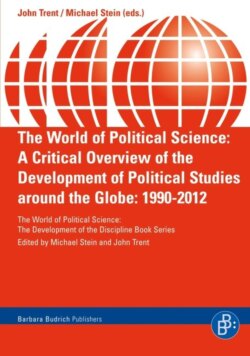Читать книгу The World of Political Science - Группа авторов - Страница 9
На сайте Литреса книга снята с продажи.
1. Is Political Science an American Social Science?
ОглавлениеIt was Stanley Hoffmann (1987) who once rhetorically asked a question, Is International Relations an American Social Science? Yes, it has been at least for the last half a century – is a standard answer to the question. The same question must be asked of political science. Has political science been dominated by Americans? Yes, it has been for the last half a century – is a standard answer to the question. In terms of amount and variety – and some say in terms of quality as well, it is undeniable that American political science has led political science for the last half a century in the rest of the world. Just as Midland, Texas has brought up George W. Bush and Tommy Franks and thus shaped United States war policy in Iraq, Ann Arbor, Michigan, for one, has exemplified and thus arguably shaped quintessentially American political science. It is this trinity of robust academic professionalism, solid positivism and heavy methodological armory that has been a trademark of American political science (Gunnell 2004; Farr and Seidelman 1993; Easton et al. 1995, Oren 2002).
In political science journals in other countries, one can easily discern the creeping influence of American paradigms and authors just by looking at the uniformly comprehensive and catholic citation practice and the plain and clear style of presentation, even if it is often unabashedly American biased. However, one can discern a robust non-American citation practice in many other countries. What is called the three stage citation style in one’s academic career still exists in most countries (Inoguchi 1985). In the early stage, you normally aspire to become a great academic and express it in the form of citing great scholars shamelessly frequently as if you were becoming on a par with Karl Marx and Max Weber, Thomas Hobbes and Jean-Jacques Rousseau, Robert Dahl and Karl Deutsch. In the middle stage when one perceives she or he has established her/his foothold among great scholars, at least in one’s areas of expertise, one starts citing one’s own works as if he or she had become a primus inter pares in the area concerned. In the twilight stage, everything looks so self-evident that she or he stops citing others as well as one’s own works. One’s article even starts with a phrase like, “As everyone knows,” which renders the whole undertaking of writing an article sound worthless. In other words, the cycle of others-citation, self-citation, and no citation in this order seems to be a universal truth governing every academic’s citation practice. A casual and self-critical glance at my own writings for the last four decades after my Ph.D. enables me to say that I have been unintentionally and thus dangerously following the three stage cycle, now seemingly heading toward the third stage (http://www.ioc.u-tokyo.ac.jp/~inoguchi). But Americans are different. Americans are an exception. They have overcome this life-cyclical pattern, says Peter Katzenstein (2006). Indeed, the multiple anonymous reviewing system plus the use of the social science citation index linked to higher salaries, positions and prestige in one way or another seems to discipline many American political scientists sufficiently to surpass the seductive three-stage citation cycle of many academics of the world.
What does the above observation have to do with the question: is a genuinely global and universal political science possible? From the above episode I am implying that the style of writing that prevails in the American political science community conveys somewhat surreptitiously the presupposition of American political science, being global and universal.
But I will not, in this article, try to argue about whether the question should be answered either positively or negatively. Instead I will try to examine three political science communities in East Asia in terms of their key features and structural conditions that sustain those features. In this sense, this study is a modest attempt to indirectly suggest that no genuinely global and universal political science is possible.
The purpose of this article is to describe how political science has been developing in the East Asian countries of Japan, Korea and China for the last quarter of the 20th century and to show that their development has been proceeding in ways that are definitely associated with American political science (often with some lags). But their development has also been inexorably grounded in the nature and dynamics of their society and politics. It is especially grounded in the nature and dynamics of their democracies: a disaffected democracy in Japan, a third-wave democracy in Korea and a possibly fledgling democracy in China. Therefore, the dominance of American political science is not a key feature of these three political science communities. Before going into these three disciplinary communities, I will first compare the three democracies that characterize the three regimes in East Asia (Inoguchi 2002). Then I will describe each of the three political science communities one by one, focusing on the kinds of subjects popular during the last quarter of the last century in relation to the nature and dynamics of each regime. Lastly, the conclusion will be drawn that points to the need to closely examine the rise and fall of topics in relation to regime self-transformation.
